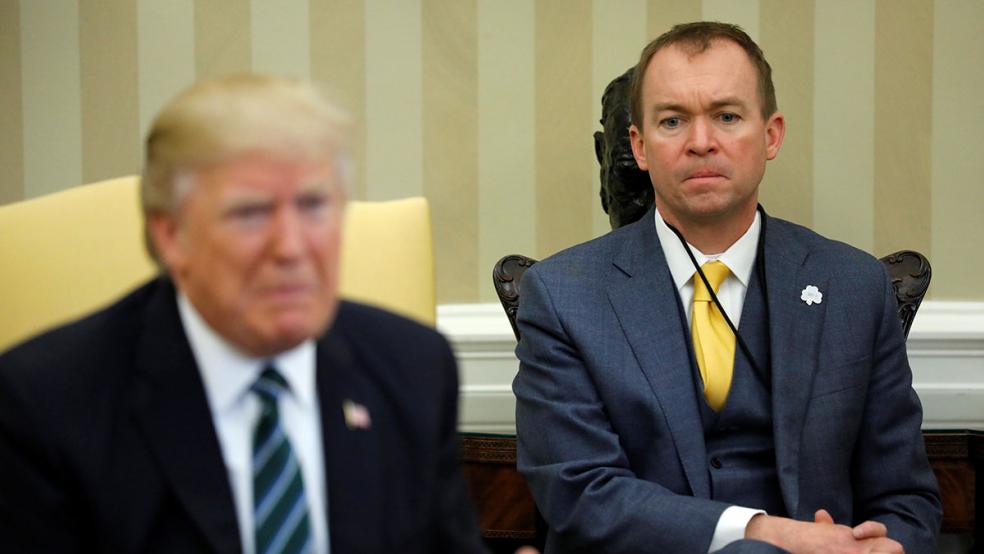There were few kind words for President Trump’s $4.1 trillion fiscal 2018 budget on Tuesday as lawmakers and policy experts gathered for an annual conference on fiscal policy and the growing national debt.
Senate Armed Services Committee Chair John McCain (R-AZ) declared the president’s budget blueprint “dead on arrival” and one that falls well short of Trump’s campaign promise of a “historic” military buildup. House Minority Leader Nancy Pelosi (D-CA) charged that the budget is based on “bogus” economic projections and violates a long-standing bipartisan agreement to “parity” in defense and domestic spending increases.
Related: Treasury Secretary Gets Grilled on Trump’s Budget ‘Draft’
And Sen. Mark Warner (D-VA) complained that the administration is seeking major tax cuts for the rich while slashing spending for Medicaid, food stamps, disability insurance and scores of other social safety-net programs.
“The budget reflects an America that I don’t think this president has any knowledge of,” said Warner, the ranking Democrat on the Senate Intelligence Committee and a former business executive. “The notion that he would go out after we still have wide swaths of our country that are struggling from the recession and dramatically cut food stamps and [welfare] and student loan support and other kinds of programs that help those still in need. To give people like me and you a tax break? It’s crazy.”
Treasury Secretary Steven Mnuchin was on hand to defend the budget – arguing that it would ultimately boost the economy and contain spending while repeatedly stressing that it is still a work in progress. “This is a preliminary document that will be refined as we go through the process with Congress determining how money is spent,” Mnuchin said.
Mnuchin and the lawmakers gathered as part of the Peter G. Peterson Foundation’s eighth annual Fiscal Summit in Washington. While the dozen or so experts and policy makers who took part in the conference offered differing reaction to Trump’s budget blueprint, they were near unanimous that the administration is not facing up to long-term fiscal challenges.
Related: 9 Top Takeaways From Trump’s $4 Trillion Federal Budget
Although Trump has vowed to put the country on a path to a balanced budget in ten years, he has skirted serious discussion about entitlement reforms and sensible tax policy that would slow the rate of growth of the national debt and prevent shortfalls in Social Security and Medicare as more and more baby boomers retire.
The gross national debt is closing in on $20 trillion, the highest level since 1950 and projected to grow rapidly in the coming years. The non-partisan Congressional Budget Office (CBO), government watchdog groups and other deficit hawks warn that – absent major policy changes – runaway debt will undermine economic growth and drive up the government’s interest costs at the expense of other programs.
Trump promised during the campaign that he would protect Social Security, Medicare and Medicaid from budget cuts, but reneged on protecting Medicaid, the health care program for the poor, from deep budget cuts by House Republicans. For now, at least, he has made good on his pledge to leave Social Security and Medicare for seniors unscathed.
However, lawmakers from both sides of the aisle and budget watchdogs argue that the president must ultimately face up to the need to slow the growth of the major entitlement programs to avoid their insolvency and drain on government coffers.
Throughout the day-long conference, organizers and participants renewed their calls for a bipartisan compromise along the lines promoted by the old Bowles-Simpson deficit commission to contain entitlement spending and long-term debt. Those measures included raising the retirement age, adjusting the cost of living formula and raising payroll taxes.
Related: Why Trump’s Spending Plan Won’t Really Balance the Budget
Michael A. Peterson, president and CEO of the Peterson Foundation, told the gathering that Trump’s budget “does not address the key drivers of our long-run spending: Social Security and Medicare.”
“For many years, both political parties have delayed, deferred and ignored the uncertain outlook for these essential programs, and they are now facing insolvency over the next two decades,” Peterson said.
“We’ve got to fix entitlements,” McCain said “It’s going to mean sacrifice which means it’s got to be bipartisan. But it won’t happen until there’s a crisis when we’re starting at either a collapse of the entitlements or some other aspect where we are forced to act.”
Pelosi, a liberal Democrat, agreed that Congress and the White House must take on the sensitive issue of entitlement reform, but argued that Republicans must consider options other than cutting benefits – including raising taxes or closing costly tax loopholes for special interests.
“You just can’t always go to entitlements,” she said.
Related: The Heartless Tradeoffs in the Trump Budget
However, House Minority Whip Steny Hoyer of Maryland, a fiscal conservative, argued that Republicans and Democrats must work together “to get the country back on a responsible fiscal path.”
Trump’s budget, called “A New Foundation for American Greatness,” calls for a smaller-than-expected $43 billion increase in defense spending as part of Trump’s pledge to mount a historic buildup and modernization of the military. He is also seeking separate overseas contingency operations funding of $64.5 billion for ongoing military operations in Afghanistan and Iraq.
The administration claims that military spending would increase by 10 percent under the president’s budget, but McCain insists Trump has exaggerated the increase and that it only amounts to 3 percent more than former President Obama had requested.
“It does not rebuild the military; it doesn’t give us the ships and the numbers of personnel that we need and the capabilities that we need,” McCain said. “We are facing challenges on a level we haven’t seen since the Cold War, and this budget is totally inadequate.”
Pete Peterson funds The Fiscal Times, an independent news and opinion organization, as a private venture. The Fiscal Times is not associated with The Peter G. Peterson Foundation.





